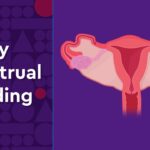Embarking on the journey of womanhood comes with its fair share of questions and uncertainties, especially when it comes to that monthly visitor we fondly call our period. In this blog, we’ll dive into the answers to some of the most common questions surrounding menstruation to empower you with knowledge and confidence.
1. What is a Period?
A period, also known as menstruation, is a natural part of the menstrual cycle where the lining of the uterus is shed through the vagina. This typically occurs monthly in women who are not pregnant, marking the end of one menstrual cycle and the beginning of another.
2. What’s the Average Age to Start Your Period?
The average age for girls to start their period is around 12, but it can happen anywhere from ages 9 to 16. Factors such as genetics, body weight, and overall health can influence the onset of menstruation.
3. What Are the First Period Symptoms?
The signs of a first period can vary, but common symptoms include breast tenderness, mood swings, abdominal cramps, and a white or clear vaginal discharge. Some girls may experience these symptoms a few days before the actual period starts.
4. How Long Does a Period Last?
On average, a period lasts about 3 to 7 days. However, the duration can vary for each individual. Factors such as stress, hormonal changes, and overall health can influence the length of your period.
5. How Often Will You Get Your Period?
Most women have a menstrual cycle that lasts about 28 days, although anywhere from 21 to 35 days is considered normal. The actual bleeding (period) usually occurs for 3 to 7 days within that cycle.
6. How to Deal with Period Cramps
Period cramps, or dysmenorrhea, can be managed with various approaches. Applying heat to the lower abdomen, taking over-the-counter pain relievers, practicing relaxation techniques, and regular exercise are effective ways to alleviate cramps.
7. Why Your Period Is Late
A late period can be caused by various factors, including stress, changes in weight, hormonal imbalances, or certain medical conditions. If you’re sexually active, pregnancy should also be considered. Consult with a healthcare professional if you have concerns about a consistently irregular menstrual cycle.
8. How to Stop Your Period
While it’s not recommended to stop your period regularly, you can use certain hormonal birth control methods, such as birth control pills or hormonal IUDs, to regulate or reduce the frequency of your periods. Consult with a healthcare provider to explore these options.
9. How to Induce Your Period
If you’re experiencing a delayed period and not pregnant, inducing your period naturally can involve practices like staying hydrated, managing stress, and maintaining a healthy lifestyle. However, it’s crucial to consult with a healthcare professional for personalized advice.
Navigating the world of periods can be a journey of self-discovery. By understanding the intricacies of menstruation, you empower yourself to make informed choices about your health and well-being. If you have specific concerns or questions, never hesitate to consult with a healthcare provider who can
provide personalized guidance tailored to your unique needs. Embrace the changes, stay informed, and remember, you’re not alone on this journey.



